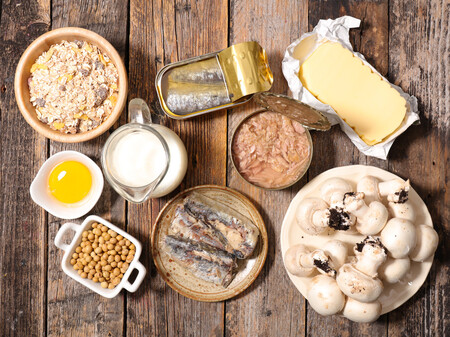Vitamin D is the vitamin that we always associate with the health of our bones and that we know we can synthesize when we expose ourselves to the sun. Therefore, in this winter season it is important to increase your intake to prevent the deficit in the body. We tell you all that vitamin D can do for your health and we leave 37 recipes that help to add it to our usual diet.
The many functions of vitamin D
Vitamin D is a nutrient of great importance for our body and this is demonstrated when we identify its functions, which we detail below:
–
–
–
Contributes to the absorption of calcium
When we talk about vitamin D we always recognize its participation in calcium absorption, which affects the health of our bones and teeth that have this mineral as the main component.
Taking care of the intake of vitamin D is thus a good nutritional resource if we look for prevent osteoporosis o guarantee the proper growth and development of bones and teeth, by favoring the absorption of football and its adequate proportions in relation to those of phosphorus.

 —
—
Supports cardiovascular health
Vitamin D intervenes in the contraction of the heart and can lower blood pressure helping to moderate cardiovascular risk factors.
A deficiency of vitamina D has been associated a higher incidence of various heart diseases, and although the exact mechanisms are not known, it could be many pathways that allow vitamin D to be beneficial for cardiovascular health, as the studies.
Contributes to cancer prevention
According to a investigation large, elevated vitamin D levels are associated with a lower risk of cancer of different types.
Especially high levels of vitamin D have been linked to less incidence of liver cancer, but also, adequate levels of this nutrient would serve to keep us away from breast cancer before menopause.
Apparently, the benefit of vitamin D comes from its reducing effect on the proliferation and survival of cancer cells as indicated by a study.

–
–
–
Helps achieve and maintain a healthy weight
The scientific evidence points out a relationship between obesity and vitamin D metabolism, as well as the presence of hormones that regulate hunger and appetite, influencing body weight.
There are studies that points out that higher levels of vitamin D have lower levels of adiposity and waist circumference, that is, less belly.
Too it has been observed a relationship between low levels of vitamin D and fatty infiltration in muscle tissues, which may characterize obesity and associated metabolic disease.
Although the mechanisms are not well understood, we must know that vitamin D in adequate proportions is key to achieving and maintaining a healthy weight.

 —
—
Intervenes in the functioning of the immune system
Vitamin D influences in different ways in the immune response of our body to various diseases.
Such is so could help prevent infectious diseases like a cold or flu common, as well as to successfully cope with or reduce the chances of developing Covid19, according to a recent study.
Helps prevent the development of diabetes
Either indirectly by benefiting body weight control or directly by influence insulin production by affecting the functioning of the beta cells of the pancreas, the Vitamin D deficiency has been associated with increased development of diabetes mellitus.
Likewise, Have been observed improvements in insulin sensitivity when given vitamin D supplements, therefore, we must consider this vitamin as a nutrient key to preventing metabolic diseases of all kinds, including diabetes.

 —
—
37 recipes to add vitamin D to your dishes
We already see that the vitamin D it constitutes a nutrient with multiple functions in our body, even far beyond the care of our bones. Therefore, it is highly beneficial for the body.
Although we can get it by exposure to the sun Because it is synthesized in our skin, in winter it is advisable to eat it through source foods.

–
–
–
Vitamin D predominates in foods of animal originSmall amounts can be found in mushrooms and mushrooms or in cereals as well as other enriched products.
In order for us to guarantee an adequate intake of vitamin D this season, we leave the following recipes:
Dishes with fatty fish
Vitamin D is soluble in fat, so oily fish is a healthy source of this nutrient. We advise to obtain it the consumption of herring, conger eel, fresh or smoked salmon.

 —
—
 —
—
Recipes with various dairy products
The milk and its derivatives, yogurts and cheeses are good sources of vitamin D for the body. Therefore, we can go to its intake in the usual diet during the winter:

 —
—
 —
—
Egg preparations
In the yolk We find a large amount of vitamin D that we can take advantage of in different dishes in a very simple way.





